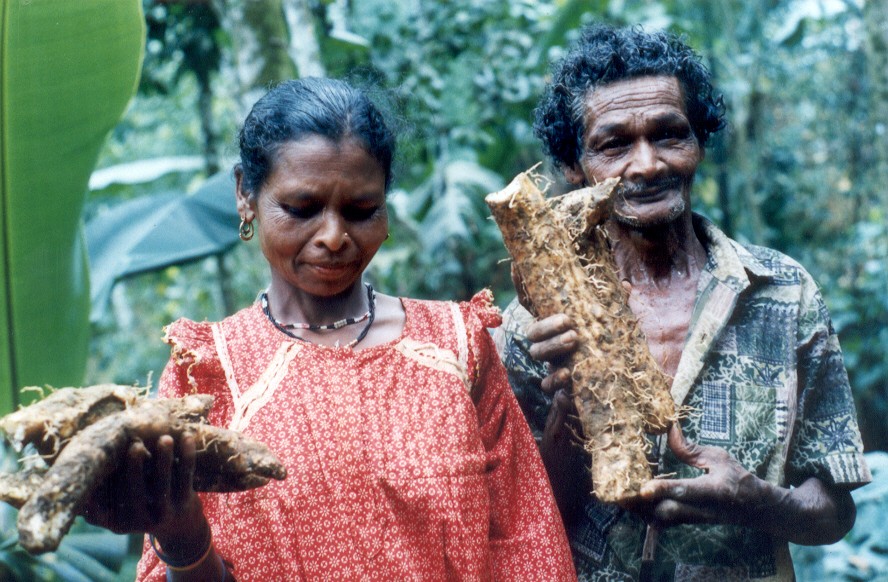Malabar region in Kerala state, holds a high degree of diversity among tuber crop varieties, specifically yams and taros. These crops are most prominent on family farms and thrive in wild/semi-wild conditions. They are an important source of starch and are also rich in minerals. Tribal communities are dependent on these crops during periods of seasonal or acute food scarcity (Balakrishnan Vet.al. 2003). However, many of the traditional cultivars and wild species/varieties of these crops – particularly yams, taros, and elephant foot yam are neglected due to changing food preferences
Attempting to conserve these crops, MSSRF studied the yams and taros of the Malabar region. The study captured 23 varieties of three cultivated Dioscorea species, 17 varieties of nine wild Dioscorea species, eight varieties of a single cultivated Colocasia, four varieties of a wild Colocasia, one species of Xanthosoma, and two species of Alocasia (Ratheesh Narayanan, M. K. et.al. 2004). The survey showed exclusive germplasm for wild species of tuber crops, including the documented varieties/species for ex-situ conservation.
Considering that yams and taros form one of the major staple foods for marginalised communities (particularly the Scheduled Tribes), MSSRF promoted the vanishing varieties of tuber crops along with food crops in the backyard gardens of rural communities. NOORAKIZHANGU, Nallanoora, Chenakorana, Manalkorana, and KAALUVENNI are some of the wild varieties promoted. The cultivated varieties of Dioscorea viz., Inji kachil, Neendi kachil, Thoonan kachil, QUINTAL kachil, KUZHIKKAVITH, and Irachi kachil were planted in these gardens as well. The benefits of growing and eating a variety of food groups were explained to the families.
MSSRF raised awareness on the conservation of tubers, and improved the farming skills of the tribal communities in Wayanad. Much enthusiasm among communities, particularly with the backyard gardens and community plots, contributed to the adoption and protection of a wide variety of tuber species in the Malabar region.
Outcomes: More than 3000 tribal families manage backyard gardens with diverse tuber crop varieties and have access to it. This programme led to the establishment of 23 Community conservation plots with preferred varieties in ifferent parts of Kerala. The most significant outcome is that the KATTUNAIKKAN — one of the five primitive tribes in Kerala (KIRTARDS) –now grow food crops in their backyard gardens. This community had no prior experience in farming and learned this livelihood skill from MSSRF over the last 18 years. The KATTUNAIKKAN tribe were largely dependent on forest produce and wild roots for daily food, but now their backyard produces diverse food crops around the year for their families. This was particularly significant during COVID-19 pandemic when many continuous lockdowns limited mobility to local markets, and halted livelihood activities.
Inspired by MSSRF’s tuber crop programme, many institutions such as the State Agricultural Department, Kerala Biodiversity Board, District Panchayat, District ‘Kudumbasree’ Mission, and other interested NGOs and CBOs came forward to conserve and promote cultivation of tuber crops.

By reviving CULTIVATION of neglected TUBERS, MSSRF makes 3000 tribal families more food SECURE, and sets UP 23 COMMUNITY conservation plots with preferred varieties in different parts of Kerala
